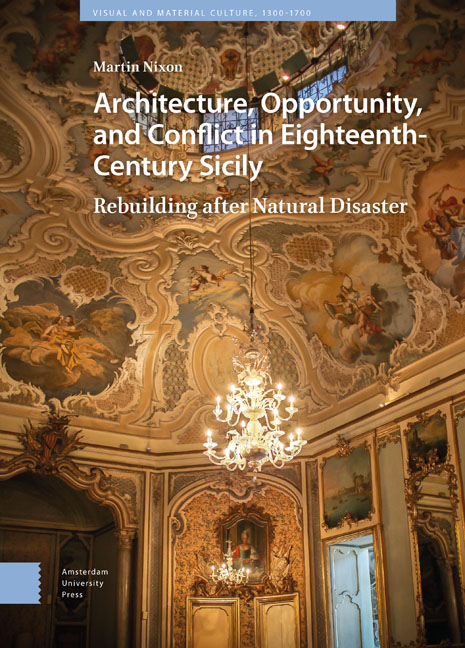 Architecture, Opportunity, and Conflict in Eighteenth-Century Sicily
Architecture, Opportunity, and Conflict in Eighteenth-Century Sicily Book contents
- Frontmatter
- Contents
- List of illustrations
- Acknowledgments
- Introduction: The Val di Noto Rebuilding: Disaster and Opportunity
- 1 Sicily as a Colonial Possession c. 1600–1750: Subordination and Resistance
- 2 The Hexagonal Towns of Avola and Grammichele : Urbanism, Fortification, and Coercion
- 3 The Palaces of Noto: Ornament, Order, and Opportunism
- 4 The Palazzo Biscari in Catania: Lightness, Refinement, and Distinction
- 5 The Palazzo Beneventano in Scicli: Trauma and Violence
- 6 The Palaces of Ragusa: Abundance, Famine, and the Grotesque
- Conclusion
- Glossary
- Bibliography
- Index
1 - Sicily as a Colonial Possession c. 1600–1750: Subordination and Resistance
Published online by Cambridge University Press: 24 November 2023
- Frontmatter
- Contents
- List of illustrations
- Acknowledgments
- Introduction: The Val di Noto Rebuilding: Disaster and Opportunity
- 1 Sicily as a Colonial Possession c. 1600–1750: Subordination and Resistance
- 2 The Hexagonal Towns of Avola and Grammichele : Urbanism, Fortification, and Coercion
- 3 The Palaces of Noto: Ornament, Order, and Opportunism
- 4 The Palazzo Biscari in Catania: Lightness, Refinement, and Distinction
- 5 The Palazzo Beneventano in Scicli: Trauma and Violence
- 6 The Palaces of Ragusa: Abundance, Famine, and the Grotesque
- Conclusion
- Glossary
- Bibliography
- Index
Summary
Abstract: This chapter presents some important aspects of the politics and economics of eighteenth-century Sicily in order to orientate the reader before moving to the architectural case studies in the chapters that follow. At the time of the 1693 earthquake, Sicily was ruled from Iberia for 400 years, but in the subsequent 50 years it passed through Savoyard, Austrian, and Bourbon rule. The changing foreign dynasties appointed their own viceroys to rule the island, but the aristocratic families were the real power at the local level. The aristocrats maintained their control, but there was always the fear of foreign invasion and of insurgency resulting from famine. The post-earthquake rebuilding took place against a background of aristocratic dominance but also of insecurity and opportunism.
Keywords: Spanish Empire, Southern Italy, Sicilian history, Sicilian architects, European aristocracy, Val di Noto rebuilding.
Sicily's Agricultural Economy at the Time of the 1693 Earthquake
This chapter will present some important aspects of the politics and economics of Sicily at the time of the earthquake. This is intended to orient the reader before moving to the architectural case studies in the following chapters. The chapter discusses Sicily's role as a colony and the political dominance of the Sicilian aristocracy, after which it outlines the actions of government representatives in the initial rebuilding following the earthquake. This provides some of the local context within which the architecture discussed in the case studies operates.
At the time of the 1693 earthquake, Sicily was a Spanish colony, although within two decades the Spanish lost possession of the island and by 1734 the island had passed through the rule of Savoy, Austria, and the Bourbons of Naples. Sicily was a colony whose political fate was strongly influenced by the shifting alliances between European powers and which could be traded according to peace treaties and marriage alliances decided elsewhere. The Sicilian nobility had to adapt to these changes in order to maintain their own position, but the foreign rulers also needed aristocratic support for their rule and thus mainly preferred to leave existing social and economic hierarchies intact. The result was a continuous negotiation of relations between the colonial power and the aristocrats.
For the Spanish crown in 1693, Sicily provided two main benefits. One was strategic.
- Type
- Chapter
- Information
- Architecture, Opportunity, and Conflict in Eighteenth-Century SicilyRebuilding after Natural Disaster, pp. 29 - 50Publisher: Amsterdam University PressPrint publication year: 2023


